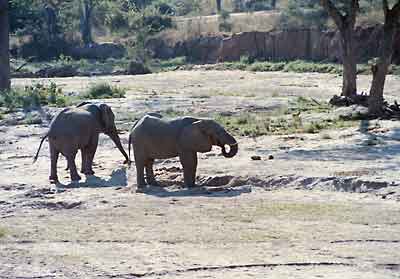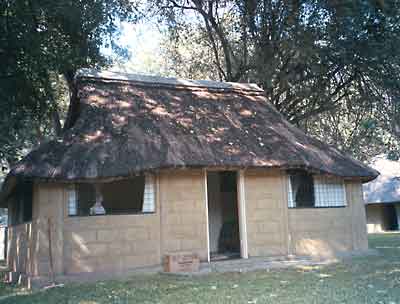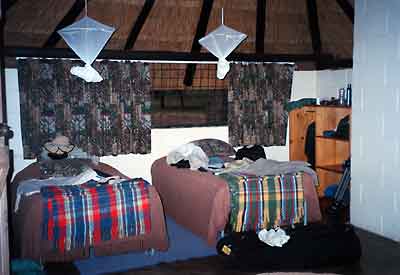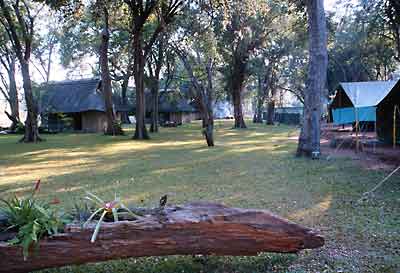
Elephants sucking mud on the Chewore River
We got into Harare around 9 p.m. local time, and then played the hurry-up-and-wait game in the line for immigration. Couldn't help but notice that there was a portrait of Zimbabwe's president Mugabe hanging above almost every door in the airport. But at last, we were outside the airport and really in Africa. We were met by UTc, the local tour company contracted for the trip, and taken by bus to the Harare Sheraton.
The streets of Harare looked pretty grim in places, with dozens of people sleeping on the sidewalks and makeshift campfires by the curb. When we pulled up at the Sheraton, we were met by a large retinue of native singers and dancers. I stood there just numbly staring, utterly brain-dead for a few minutes, until it occurred to me that this was probably the sort of thing I should be photographing.
It was an enormous relief to finally step into a nice room with a big comfy bed, but our night was not over yet, we still had a "welcome to Africa" dinner to go to. This would have been a much nicer affair if we weren't all so brain fried.
The next morning, everything was better. Although it would take a couple days to completely get past the jet lag, the six or seven hours of sleep I'd gotten were sorely needed. A copy of the Harare Herald left outside our door had a page of articles about the eclipse. Along with the usual "don't look directly at the Sun" warnings, one of the articles was headlined "Traditionalists warn of bad omen." Some excerpts:
While the modern world is euphorically awaiting the once-in-a-lifetime wonder of the total solar eclipse tomorrow afternoon, traditionalists in Zimbabwe are wishing it never happens, experts said this week. African traditionalists regard the convergence of the moon and the sun as "kuwora kwezuva - rotting of the sun" which they say is a bad omen that is preceded by misfortunes caused by a vengeful spirit called Maruvembere, which punishes evil-doers. [T]he Zimbabwe National Traditional Healers Association [Zinatha] warned of new incurable diseases, deaths of prominent people and natural disasters as some of the misfortunes that might befall Zimbabweans after Thursday.
Aside from the fact that they apparently cannot distinguish "preceded by misfortunes" from "after Thursday," predicting the "deaths of prominent people" in that part of Africa is a little like predicting earthquakes in LA.
The Zinatha national executive met on Monday to deliberate on the phenomenon and work out plans on how to help the nation if, as they anticipated, their expertise was required after the eclipse. 'I can assure you the Gods are not happy,' said Zinatha spokesman Mr Peter Sibanda. 'These natural occurrences such as floods caused by cyclones and the eclipse are not a mere coincidence. They are signs of the punishment we are going to receive from our ancestors. Mr Mugovera Karumba (80) of Kambuzuma agreed with Zinatha that an eclipse was a sign of bad things to come. 'I am surprised that people are taking it lightly and even joke about it,' said Mr Karumba, who recalled how a whole family perished following an eclipse 30 years ago.
These guys are really gonna be upset when they discover that another total eclipse is due to roll through the area in December of 2002.
After a quick breakfast, we bundled into the UTc busses, and headed off north toward our first safari camp, up near Mana Pools national park. The drive was mostly scenic and loaded with photo opportunities, but that's the chief disadvantage of taking a packaged tour, you can't stop at every photogenic dead tree you see.
We also passed more than one checkpoint manned by armed guards, sometimes police, sometimes just local guys with guns. One roadblock, outside the town of Chinhoyi, took us a particularly long time to get through, and we learned from our driver that the area was having local elections, and the guards were there to keep away outside troublemakers wanting to stir up protest or anything. The town's emblem had crossed AK-47 machine guns on it.
Around 1 in the afternoon, we pulled into Makuti, and transferred to safari jeeps, our main mode of transport for the rest of the trip. These are big, beefy 4-wheel-drive vehicles with bench seats for about 10 people, designed to slog around in the bush chasing wild animals. Over the course of the trip, we experienced several different variations of this vehicle, some of them better than others. You quickly discover, for example, that you don't want to ride in one that has a metal crossbar just inches above your head. We eventually found that it is also the custom to stay with one vehicle and one guide/driver for the entire length of your stay at a camp. Some guides are much more skillful than others, and getting a good one can vastly improve your safari experience. The catch, of course, is knowing in advance which jeep to get into.
Another hour or so of driving on paved roads, and we reached the end of the pavement and headed out on the dirt roads common to the wilderness areas. These roads are typically bone-jarringly bumpy and dusty, so a hat with a chin strap and some sunglasses or other eyewear are a good idea here.
 Elephants sucking mud on the Chewore River |
Up to this point, we had had only a few fleeting glimpses of wildlife, mostly small troops of baboons glaring at us from the side of the road. But as we headed deeper into the wilderness, we began to see the occasional impala or kudu. An hour or so down the dirt road, we crossed a bridge over the mostly-dry Chewore River bed, and saw our first elephants, a pair of them burrowing their trunks in the dirt looking for hidden wet patches. Baobab trees, with their ludicrously thick trunks and nearly insignificant branches, were everywhere. In some places, the road had been split in two around a large baobab. |
In the late afternoon, we turned off the main dirt road and trundled up a wide path in
the bush towards the safari camp, pulling in at a little after 5 in the afternoon. This was
our first impression of safari camps, and it didn't bode well. It was quite...er...rustic, most
of the lodgings were just two-person tents. There were a few permanent structures, and
Dave & Kathy and Pam and I had arranged to book one of them, a concrete block box
with a thatched grass roof on it, and four small beds. Ron shared one of the tents with
Jim. It wasn't really a closed building in any meaningful sense, the windows were
covered only by large metal grates to keep out anything larger than a small bird, and there
were fairly large gaps between the roof and walls. The beds at least all had mosquito
netting above them. Nonetheless, our "room" was the luxury accommodation
in the camp, it even had its own attached bathroom...and that is an important
consideration in a safari camp. Crossing even a few meters of open ground to go to the
john in the middle of the night is actually quite dangerous; we heard leopards, lions, and
hyenas outside every night. Our room also had electric lights, but they only worked
during the few hours at night when the camp's generator was turned on, and one of them
not very well even then. Our expensive, yet rustic accommodations Photo by Kathy Lindquist |
 All the charm and comfort of a minimum-security prison camp Photo by Pam Bloxham |
There were actually quite a few things we didn't like about this place. It was normally a hunting camp, and pictures of "Great White Hunters" with dead animals lined the walls of the dining area. There were brochures that listed the prices for killing various animals, $10,000 for an elephant and so on. But the thing we found the most disturbing was the racial divide in the staff. The owners and guides were all white, the menial workers all black, and it seemed this camp was a little bit of old Rhodesia preserved. The black workers went around with kind of stooped shoulders, and would never seem to look a white person directly in the eye. The owner of the camp, a large, loud man, never seemed to just talk to the black staff, he was always yelling at them, sometimes in English, sometimes in Shona, if he didn't want the rest of us to know what he was saying.
 The eclipse camp |
Jim Huddle assured us off on the side that our travel agent wouldn't normally book us into such a place, and that it was chosen solely for its favorable eclipse location, all of which we later found to be true. |
The food there was good but not great; it reminded me of the description of the cattle drive chow in the film City Slickers: "brown, hot, 'n plenty of it." In addition to more familiar fare like chicken, we also got to sample several different game dishes, like kudu and eland.
While we were milling around in the dinner/socializing area (called a "boma") before dinner, somebody handed me a shot glass with a cream liqueur in it, and said, "here, try this." And so was I introduced to Amarula, a marvelous drink distilled from the fruit of the Marula tree, somewhat like an African Bailey's Irish Creme. The label of the bottle has the image of an elephant on it, and we were told that the elephants eat fermented Marula fruit in the wild and get tipsy. Facing a drunken elephant is something that is amusing to imagine, but probably wouldn't be as much fun in real life.
The first shot of Amarula was free: that's how they get you hooked, the rat bastards. After that, you had to pay the regular prices at the bar for it.
Shortly after dinner, I returned to our cabin to get something, and discovered something I hadn't noticed before: the door had no outside knob on the handle, just the spindle sticking out. I went back to the main room and mentioned this to our host. He told me that it had never had a knob, you have to open the door by bashing through it with your shoulder, cop-style. Really. I waited for a few seconds for the punchline, but it never came: he wasn't kidding. Hey, whaddya want for your lousy $6000?
It got cold overnight. Maybe down to the freezing range. I was glad I'd brought my expedition-grade Patagonia thermal underwear, I really needed it. Nobody really slept well that first night, still too much jet lag, spooky animal noises, and people snoring...and eclipse anxiety.
PAGE: 1 | 2 | 3 | 4 | 5 | 6 | 7 | 8 | 9 | 10 | 11 | 12 | 13 | 14 | 15